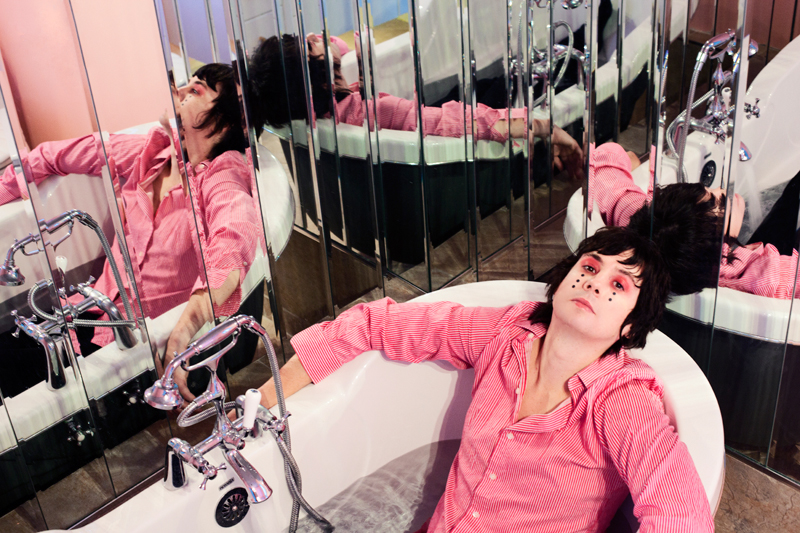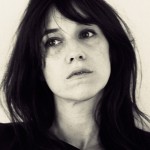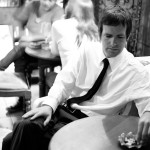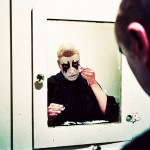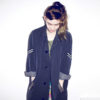Photos by Vinna Laudico
Interview by Andrew Parks
Read the first part of our extensive Johnny Jewel interview in the magazine excerpt below–an early look at the issue we’ll be officially releasing later today–right alongside the rest and lots of audio from throughout the producer’s career…
So what kind of wall did you hit in Portland that made you want to leave there? Did you just want to get out of the country?
Well, I’m pretty hyper-American, being from Texas and all. But I was feeling like I wanted to go where no one knew who I was.
Right. Portland’s a pretty small, tight scene.
And we were there for a long time. There’s only so many cafes you can go to if you don’t want to run into anyone. It doesn’t help that our studio’s right next to the most popular club in Portland, so people would always text me when a party lets out, being like, ‘Let’s come up to the studio and hang out, see what you’re working on.’ I didn’t move to Portland for its scene. I love the Wipers and all that, but the air was just magnetic; I felt really alert and inspired mentally. Like I love L.A., but I feel very fatigued every time I’m there. And in New York, I always want to go out. I need to turn my mind off when I’m working and I always feel preoccupied when I’m in big cities.
I was thinking about moving to Paris or Mexico City at first, but Montreal ended up being more practical because I have a studio here and a studio in Portland, and everybody just flies back and forth. No one ever knows when I’m in Portland now, either. [Laughs]
Are you going to try and be a dual citizen soon?
Hopefully. I just got my fingerprints back from the FBI, and something that says I’ve never been arrested and I have no known political affiliations. I’ve been lucky not getting into trouble for the stupid shit I’ve done.
You don’t seem like someone who breaks the law much. So what do you mean?
Stupid things like stealing things I can’t buy for an art piece or peeing outside. Portland being the hipster playground that it is, you don’t think of it as breaking the law but it is. And now I don’t do any of that. We’re also really strict about certain things on tour. None of us do drugs, but some of our friends do, and they’re not allowed to travel with it if they’re with us.
Did anyone from your bands move up there with you?
No, but I have a house up here, and they’ll stay for two to four weeks at a time. There’s plenty of room, and I have a studio in the city and a studio in my basement, so we tend to work a lot.
That’s one thing I wanted to ask you: aside from working on Chromatics and Glass Candy pretty regularly, you’re also producing other people all the time. So do you have to block out specific days for each project, or do you bounce between them as inspiration strikes?
I bounce. Ida was just here for two weeks before our New York [Fashion Week] show, and we were supposed to do Glass Candy stuff, but I didn’t feel ready for it yet so she was writing on her own and I was working on some other shit. It happens. The only time I ever set aside a certain amount of time for something was [Drive]. I had to block everything else out and focus on that.
They literally gave you a month right?
Yeah, I was working on someone else’s schedule, which I don’t like anymore than I like doing homework for school.
As stressful as that process was, it must have been rewarding in a way, as it proved you could handle that kind of quick turnaround.
Well, I’m still alive, you know? But I don’t know if I handled it well back then. It was a great challenge, but I’d actually say I got less done in that period than I normally would because I had really strict parameters for what I’m trying to accomplish. Normally, it’s just like wild style with what I choose to record. There’s no limit. But yeah, it was a great exercise and it forced me to work on some instrumental stuff within a pop structure, which I’d wanted to do for a long time. I’d already been working on Symmetry for three years, but I didn’t have a reason to focus on it. And once I went back to vocal-based work, I was back with a vengeance.
You also had specific reference points for Drive right? Like a little bit of Eno here, or some of the Social Network soundtrack there?
Yeah. A lot of people vibe out on a track in the studio. I start out completely in the dark, with a piano or a drum machine. Then I record as a write, and I improvise. That’s why the music is usually so loose. So I’m not as used to having reference points like I did on Drive. That was a little invasive–like running with ankle weights on, and once you take them off, you feel really light.
Some of the records you’re putting out this year were first promised as early as 2009. Have you scrapped a lot of songs in the interim because you’re a bit of a perfectionist?
I’m a perfectionist, but it’s more of a design or production thing than songwriting. When a song is written, it’s really explosive, but then I become a perfectionist in terms of how I’m going to present that song to the world. A song is much different than a beat. Like you could play any Bruce Springsteen song and it sounds like Bruce Springsteen.
The songs haven’t been scrapped. If anything, there’s too many of them, so they have to be put into groups alongside different production voices. And once I find the proper context of a song, it has to fit the overall idea of the album. Everything has to be a cog in the wheel, serving the ultimate purpose of the record. That’s what takes so long. Like Body Work has 45 tracks that need to be narrowed down to 15. And Kill For Love was narrowed down from 36 tracks to 17. It’s not even about what’s the best song, or finding the one single and wrapping the rest of the record around that. I often put things that’re hot on hold, like “Into the Black†was recorded in 2009 and we just released it yesterday. I’ve been sitting on it this whole time because we needed to find other songs that’d go with it. That song has a lot of meanings already, but in a literal sense for Chromatics, it’s the first song we recorded after the buzz for Night Drive. In 2008, I was already seeing how the indie world and the electronic world was going to become more prevalent. So I wanted to bring it back to an album opener that says, ‘Rock ‘n’ roll can never die.’ Because everyone‘s using synths now. I was so tempted to put it out as a single two years ago because that song’s so awesome. I think it’s my favorite vocal take of Ruth’s. Until yesterday, no one in the band had a copy of the song. I wouldn’t let anyone have it because I was so paranoid someone would put it out.
You don’t let Mike from the label hear anything until it’s out either, right?
Right. I’m really paranoid that way. It’s no disrespect to Mike; I’m just really protective of my stuff. I used to love sharing demos and stuff on MySpace, but as we reached a wider audience outside our core fans, I noticed that my conceptual leaps were being misconstrued as proper follow-up tracks. So I stopped sharing them until they were ready to come out. That’s what happened with Symmetry–it dropped on Soundcloud a few days before Christmas, so everyone in the world heard it at the same time. It drives booking agents and publications crazy because I don’t give preferential treatment to the press. It’s funny–people think the Chromatics record is never going to come out because no one has advance copies of it, but it’s done. I’m just not going to let anyone hear it. [Laughs] I’d rather everyone hear the songs in sequential order when it’s ready. Like “Into the Black†is very guitar-oriented, and I love leaving people wondering whether the entire record is going to be folk-y like that.
I love how subtle that cover song is. A lot of electronic producers would put a big beat behind it, but you left it pretty spare.
That was the essence of the song for me, because we’re producers but we’re also songwriters. Chromatics may be on the cutting edge tonally sometimes, but we’re such a traditional group in the classic sense of Joy Division or the Velvet Underground. Glass Candy is much more experimental. There will be plenty of disco beats on the Chromatics album, but I wanted to cleanse the palette first.
You mentioned that the Chromatics and Glass Candy albums both work as a total package. Can you tell us anything about how that package might look and sound?
Glass Candy is harder, and more aggressive, than Beat Box. That’s the main difference.
What do you mean by that? Like a more refined way of how aggressive and no-wave-y Glass Candy sounded in the beginning?
That had more to do with us not knowing how to record or play, yet wanting to do everything ourselves. We definitely struggled with what we were trying to accomplish. I would say the new album is aggressive compared to the last album, “Feeling Without Touching†and “Geto Boys.†It’s more like [the Beat Box song] “Candy Castle†on steroids. Ida’s never going to rap, but the beats are more like hip-hop–wilder, bouncing around from harder electro stuff. Well, what I’d consider hard. It’s not like…
Not like what’s popular in the clubs right now–music that bashes you over the head a bit?
Right. The drums for Symmetry are very aggressive, and a lot of that came from what I was already doing on Body Work. There’s some elegant moments on the record, but most of it is pretty hard compared to how soft something like “Computer Love†is. The keyboards have some bite and buzz to them, too, and there’s some sample-based stuff that’s really grimy. You have to remember that it took me five years to complete Night Drive and Beat Box. It’s just that no one was paying attention then. Now everyone’s watching, thinking, ‘He sure is taking a lot of time with this.’ Real songs with actual shelf lives aren’t rushed.
As for how the Chromatics record sounds compared to Night Drive, it’s more pop–leaner and more abbreviated, with the experimental moments being more extreme, stretched out and vacant. If you threw Night Drive and Symmetry in a blender, it’d sound like Kill For Love, only with a stronger pop edge.
How has Ida evolved as a singer? Is she more comfortable with creating her own melodies now?
She’s still insecure. We’re all self-taught, so none of us know what the hell we’re doing. She’s definitely exploring melody more, though, like in “Warm In the Winter†and “Beautiful Object.†There’s also some spoken word on Body Work, like this awesome song called “Bringer of the Dawn†that’s her having a conversation with an ATM machine. That was the first song I recorded when I moved to Montreal three years ago.
And these aren’t interludes either, right? They’re entire songs built around spoken word?
Yeah, it’s like five minutes of poetry.
That’s pretty ballsy.
Trust me, I know. It’s going to be a love or hate thing, and I don’t really care. I love it. And then there’s an interlude track where she’s talking over a beat like that DJ in The Warriors, like a traditional hip-hop narrator in Fear of a Black Planet or Midnight Marauders.
Do you still build the music around whatever lyrics she turns in?
Oh yeah, that’s the only way she can work. That’s why Glass Candy is able to dip into hip-hop territory, production wise–because she’s a poet first, then a performer, and finally a singer. That’s why she’s so sick live.
It’s almost like, he’s the DJ, I’m the performer when you guys play.
Is that a Jazzy Jeff thing?
Yeah.
It’s like that, with me looping and chopping shit up live on one hand, and playing keyboards with the other. I try to follow her because she’s always improvising or getting stuck on interacting with someone in the audience. But yeah, her real strength is poetry. She’s the only real lyricist in our crew, writing concepts like Alan Vega, Iggy Pop or Lou Reed. They take such a long time to write, too.
How are things different in Chromatics? A lot of people don’t realize you ended up in that band by default, when everyone left the group but [guitarist] Adam [Miller].
Yeah, I was producing and then everybody slowly quit, got kicked out, or stabbed one of us. I got run over by someone who used to be in Chromatics, actually. It was a tumultuous time until it was just me and Adam. I co-wrote and produced some of the songs on the first Chromatics album, but I didn’t want to be in another band. It sounds silly saying it now, but I didn’t want to be in any bands in the first place. I started writing pop music because I loved Ida’s lyrics so much, but I never wanted to be on stage. That’s why I started wearing makeup–as a shield, and I just got used to it over time. I’d rather be in the studio, but performing had to happen to be able to support that.
But yeah, with Chromatics, me and Adam write some of the lyrics, as does Ruth. I tried to get everybody involved in the process this time, because Night Drive was mostly me and a little bit of Adam. Kill For Love is a better album because of it.
To bring things back quite a bit, when did you actually start playing music in general? And were you in any bands before you started working with Ida?
I started playing guitar in 1988. I was in a band with some dudes right after high school. We were really into Sonic Youth, Polvo and stuff like that. We played a couple shows in Houston, but we never made a record or anything. I hated having to sit there and deal with other people’s shitty parts. This was in the heyday of Pavement and early Sebadoh so…
Everyone was working on shitty four-tracks?
Right. And it wasn’t sounding like cock rock or anything like that, but it lost its frailty as a full band, so I just went back to recording and got weirder and weirder. I also used to write songs and sing about my feelings and shit. [Laughs] But I got sick of hearing my voice and went instrumental when I got into the Dead C, and the solo records of Nico and Yoko Ono. That led to modern composers like John Cage, and I was fully in that world when I met Ida. She wanted to start a band, but her guitar skills were…she had bad taste, because she was coming from a Brit-pop scene, so her guitar playing was very shoegaze-y. That’s cool now, but it was pretty passe in ‘96 or ‘97 because it had already happened.
I don’t want to make it sound like I’m dissing Brit-pop, but in the same way I love photography but I’m not a photographer, Ida loves guitar but is not a guitar player. So I made her a deal: “If you never play guitar again, I’ll be in your band. Because you have really awesome lyrical concepts, but your guitar playing is kinda cheesy.â€
And she was understanding about this?
It hurt her feelings. If anyone said that to me, I’d tell them to fuck off, you know? [Laughs] I think she thought it was intriguing as an experiment, and then she really started getting into it. Playing music with her was so different because I’d made indie rock before, but she wanted to sound like the Rolling Stones or Black Sabbath. And I didn’t know how to play like that. I didn’t understand riff culture or the blues. I was coming from a pop state of mind when it came to creating songs. So we started listening to a lot of Link Wray and early garage rock comps. That morphed into us becoming preoccupied with Kraftwerk and Can, which was the early direction of Glass Candy–us trying to do garage/disco/Kraut-type shit, which just ended up sounding like no-wave. Although we didn’t know what that was. When we put out our first record, people said we sounded like the Bush Tetras or the Contortions, and we had no idea what any of that meant. We were so isolate that we didn’t know what we were doing. Over time, we learned how to make disco music. We’d be into the Heartbreakers, the Stooges, and the Sparks record with Giorgio Moroder on it (No. 1 In Heaven).
Since I’m a huge Joy Division fan, I said, “You know, we should make Unknown Pleasures before we make Closer.†So we focused on punk for the first record, and shifted to synths for the second one much later. And now Body Work is an eclectic record that, like the best hip-hop, isn’t reliant on one specific sound or genre. It’s all over the place.
It’s that way by design, really.
Exactly. Body Work is a rap record in the same way Love Love Love is a punk one–it’s still Glass Candy at the end of the day. And most people are just going to call it electro because it involves a girl and a synthesizer, and doesn’t involve straight-up rap tracks.
It uses a lot of the same techniques and technology, though, especially since you’re coming from an analog perspective like a lot of early hip-hop–music that was made under limited means.
We were super obsessed with the first Too $hort record, the one where he’s playing the 808 [drum machine] and DX7 [synthesizer]. That’s a huge influence on Glass Candy.
That makes sense, since it’s really minimal and the drums hit really hard.
Yeah, yeah. The drums and the vocals are really high in the mix, and nothing else gets in the way. People are obsessed with the word Italo, but even Symmetry has a huge hip-hop influence from a production standpoint, like the grit of something like “Tick of the Clock.â€
Going back to the new Glass Candy album, has it reached a point where you’ve stopped recording new tracks and are focusing on figuring out the sequencing and mixing?
Yeah, sequencing and designing, finding the right wrapping paper for the songs. We’re not adding any more tracks, that’s for sure. I’m hoping that’ll be out by the end of May, right around my birthday. But if it’s not ready, whatever. People can chill out. That’s one thing about the computer world–people feel so pressured to put their music out that it becomes watered down. You need to let your art marinate, you know? One of the reasons I have my own record label is that I don’t like deadlines.
The most important thing is that there’s no filler. It’s all quality. I’m so proud of that. Not a lot of people can say that about their record label or their own releases.
I have a really random question for you to close things off: did you really get a guitar smashed against you in 2002, and since it was broken, you focused on simply playing synths from that point on?
Yeah, the first time we played Philadelphia was a house party above a lawyer’s office. And at one point, I got stuck at the bottom of a pile of about 10 people. It was really scary; I thought my neck was going to break. I was resisting at first, but then I thought, ‘Okay, I’m just going to go limp’ because the kids who got hurt the worst when I was a skater were the ones who went stiff as they fell. So I let go, got up and the neck of my guitar was broken. I didn’t realize it at first, but the strings were loose like a kid’s ukulele or something.
I realized my ribs were cracked the next day, and since we were sleeping on floors and in the van, I had the worst cough for three months because I had a bruised lung from the cracked rib. Ida and I were working at a grocery store back then because we’d make maybe $50 or $100 a show so it was sad. I even tried duct-taping the guitar back together.
I remember the last show on that tour was New York, so we were almost there. It was with Gang Gang Dance and the Rapture, and since we knew the Rapture from Seattle, we borrowed a bass from them. And once we were done, we drove back to Portland and I couldn’t afford to buy a new guitar. I didn’t want to, actually, because I couldn’t see how the synth stuff that was already creeping into our music was going to work live with guitars. Even rock bands have backing tracks now, but when we started using them in 2003, we got clowned so hard for being a karaoke band. Everyone was still in this garage rock state of mind back then, from the White Stripes to some of the disco-punk bands. That’s why I’m so appreciative that people care now–because we thought we’d be working at the grocery store for the rest of our lives.
